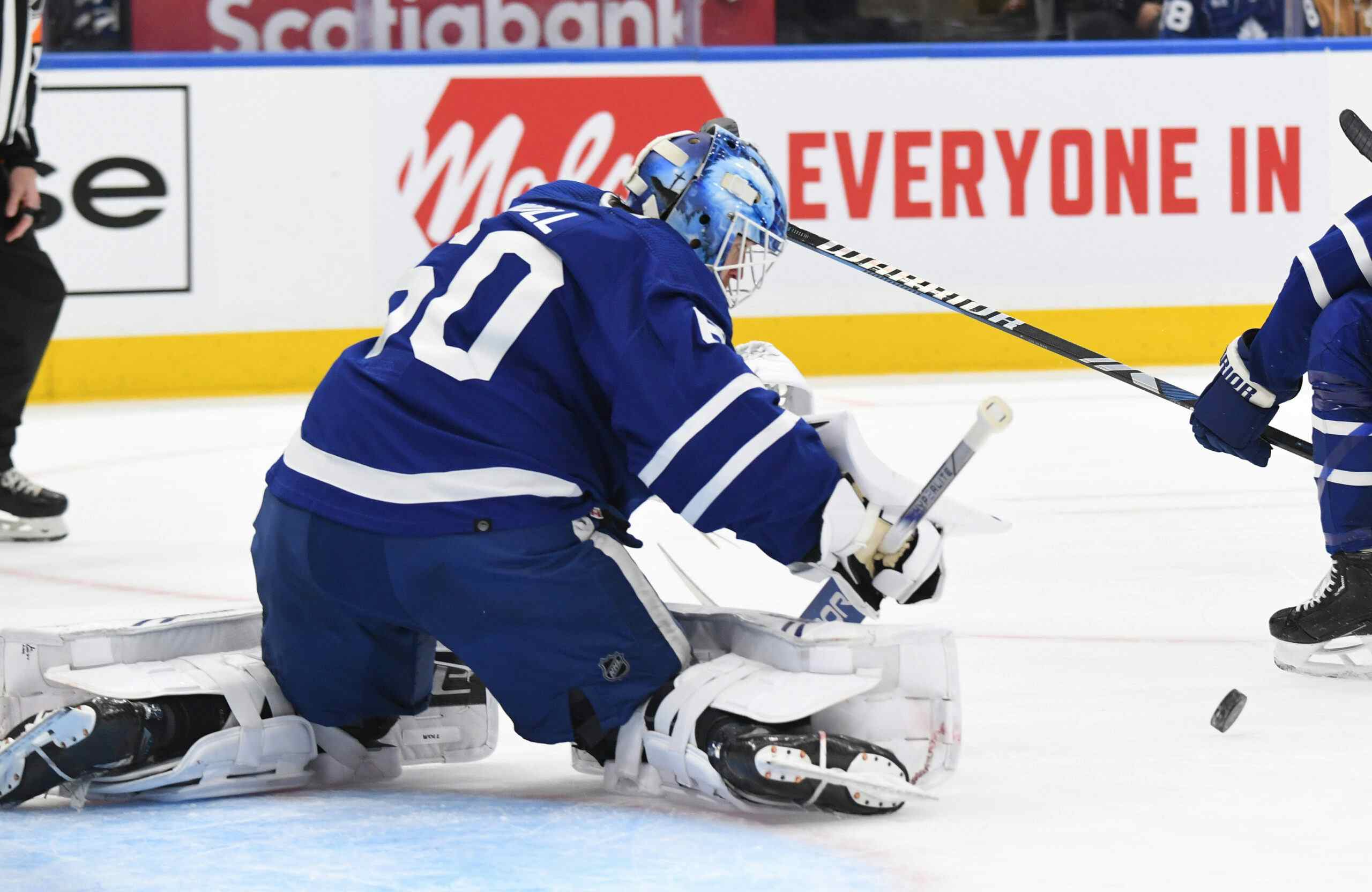Leafs’ Lamoriello Faces Serious Accusations — Is The NHL Watching?
By Greg Brady
7 years agoMaybe it’s the time of year and the hustle and bustle of it all. Maybe it’s the familiar (if not valid) refrain of another NHL retiree, an enforcer in this case, to some, “complaining” about a job he signed up for and was paid handsomely to do, simply because that job, as most inherently physical ones do, comes with a price, and in this case a heavy one.
Either way, I’m quite struck by the eerie silence surrounding the announcement as documented by TSN’s excellent investigate sports reporter, Rick Westhead. An appeals board in California for a worker’s compensation case has ruled that the New Jersey Devils are culpable and were negligent in withholding medical information and evidence surrounding their former player, Mike Peluso — and it’s information that would have potentially (almost certainly, one might deduce logically), have guided Peluso in a different direction from playing certain games and for certain stretches in time, when he should not have, due to concussions, mostly acquired from fighting.
The bullet points of the court case include the following:
- Peluso retired from hockey in the summer of 1998, at age 32, after 458 NHL games.
- In 2012, Peluso filed a workers’ compensation case in a California court, against the New Jersey Devils, St. Louis Blues, and Calgary Flames. The Chicago Blackhawks and Ottawa Senators, Peluso’s first two NHL teams were not named in the claim.
- Just last month (yes, obviously a slow-moving case, given the initial filing was four years ago), an appeals board ruled the Devils withheld two documents that the Peluso side claim are/were critical to their arguments and potential to win the case.
- The two documents are medical reports from December 1993 and February 1994, revolving around a potential head injury Peluso suffered on-ice, and the fact that he was having seizures at various times after the December fight, thus exposing him to considerable brain damage were he to suffer more trauma to that part of the body.
- Peluso was knocked unconscious in a fight with Tony Twist during a Devils/Nordiques game just before Christmas (December 18th) 1993. The medical report, to probably no one’s surprise now, or maybe even then, ruled he’d suffered a concussion.
- Peluso was (so the claim goes) pushed back into the Devils’ lineup for a December 23 game against Toronto, by the Devils coach — that would be Jacques Lemaire, in his first season with the Devils behind the bench. He suffered a head injury after an incident with Toronto’s Ken Baumgartner in that game, but regardless, Peluso stayed in the Devils’ lineup consistently through the rest of the regular season and into the playoffs, up until New Jersey’s elimination by the New York Rangers in the Eastern Conference Final.
There are other specifics, naturally, but you, even without a legal degree (and apologies if you DO have one), can see the crux of the issue. Peluso claims he was put in harm’s way and physical danger (no doubt as many NHLers have been for decades) by not only “playing hurt” as the axiom goes, but greater peril given he had begun suffering seizures, and even collapsed while on a treadmill at a hotel in between games.
Lamoriello probably looks the most callous and out of touch through his quote in a New York Times article Westhead discovered where he claimed Peluso’s treadmill collapse was a result of “dehydration and poor nutrition”, rather underselling the potential brain trauma Peluso was suffering from at the given time. Perhaps, not shockingly, Peluso had a staggering 73 more fights in four more NHL seasons before the end of his career. Imagine the countless fists to the head he absorbed, even after a season (93-94) where his overall well-being health-wise begin enduring some hellish circumstances.
All this makes the lack of reaction to this rather intriguing. We know there is a “hockey community”. We know there are “hockey guys”. We know there is a certain “code” to how hockey happens. I love the sport, it’s been a big part of my life, and I don’t want that (nor see that) changing, but this may be a real watershed moment for the league, and those who cover it.
I can certainly understand there being debate about the merits of various lawsuits surrounding the NHL’s former players and the league. Though there is a distinction to be made between the NFL and the NHL and the physical and violent nature of both sports (which we as supporters, walk the line between begrudging acceptance or outright support of said violence), the debate usually falls along the lines of “hey, the players know there’s a risk involved and get paid a ton of money to accept said risk” versus “the players should get something given the NHL was or may have been negligent in doing their best medically to make sure players have a certain standard of safety, and if that didn’t happen, compensation needs to be made”.
No one is or can outright accuse Lamoriello of being involved in hiding or withdrawing or altering documents involved in this particular Peluso case. That’s, firstly, going to be very difficult to prove without a supplementary paper trail — and secondly, he is with a new franchise now in Toronto, obviously.
But what of the look here? Any blowback at all for the Maple Leafs? Is there even the most remote PR hit to be taken when your 74-year old general manager appears to have not acted completely honourably with regard to a player’s neurological well-being, even if it was over 20 seasons ago?
It’s difficult without a google search to name the general managers in Mike Peluso’s past with the Blues or the Flames, unless your recall on that sort of thing is outstanding. But the Devils – it’s almost always the right guess to finger Lou. Despite Hall-of-Famers like Scott Stevens and Martin Brodeur, Lamoriello is as much a “face” of an NHL franchise as a GM when it comes to New Jersey as maybe anyone in all of North American professional sports. Pat Riley in Miami with the NBA’s Heat comes to mind but he hasn’t been in Miami nearly as long as Lou ran Jersey.
Do we all just accept that general managers and coaches in the NHL in prior eras did what Lou is accused of doing? Pushing players back into lineups, not allowing second opinions medically speaking (especially with regard to neurological issues), and maybe most callously, not providing full disclosure and content of the medical opinions they’re actually getting was almost certainly commonplace, right? This seems like something we all knew, and again, we now justify such past actions with “we all should have known better and do now.
I know what a major story it would be if a former NFL player, unable to work, permanently mentally disabled, and surely to die (all this is true in Peluso’s case per independent doctors) years before he should, accused an NFL franchise, and its generally famous GM and/or head coach of such transgressions. It would get discussed, debated, and kicked around whether there was legal action pending against the league or not.
Don’t get me wrong, I see BOTH sides of what is a complicated issue. And it’s a far more compelling NHL issue to many than: “hey, who’s going to win the Art Ross this season?”. Where does it all begin and end? Where did the mandate come from to be so cavalier with the health of men who deserve better, and are having cognitive issues damaging relationships with siblings, wives, sons, daughters, etc.?
I’m a huge believer in accountability, but also individual choice. But where my ability to choose what’s best for me should be intercepted by a medical expert, is when it involves my own brain and protecting it from damage. We know so much more about the bones and ligaments that hold everything together from the neck down. We know when something’s broken and we generally can make educated judgements on the best methods of fixing it. Not so with the brain, despite millions of dollars of research and the most brilliant of brilliant minds working tirelessly to do so.
Peluso’s story is incredibly sad, and we already know he’s far from the only one suffering. Should the Maple Leafs’ current general manager feel some sort of moral or ethical obligation to either deny malfeasance if that’s the case. Well, don’t count on that happening publicly. But when the court case for Peluso reconvenes, the defence truly will be “on defence” and if Lamoriello is forced to explain all this via a subpoena, I’m not sure how either the Maple Leafs or the league can protect him if it’s either legally proven (or, let’s face it, obvious in the court of public opinion) that Lamoriello committed some element of obstruction to Peluso having the proper documentation to make decisions concerning his playing status while a New Jersey Devil. The issue is would the NHL punish Lamoriello. Allegedly placing a player’s very health in jeopardy, then holding back court-ordered medical documents that might incriminate individuals and/or the organization seems a little more serious than circumventing the salary cap via Ilya Kovalchuk’s annual salary in 2027, or whatever.
Lou would be far from the only general manager in the 1990s, let alone any decade prior, passing the messages to players and empowering coaches to “play through things”. Eric Lindros went through numerous issues with Bobby Clarke in Philadelphia, and the very same accusations were levied. Incredible to think that because Lindros happened to hold out and not want to play in Sault Ste. Marie in the OHL and Quebec City in the NHL, that his suggestions the Flyers weren’t providing the best information and solutions for his growing number of concussions, that some fans and media members decided he was probably just again “being a baby”. Hopefully, most of us have evolved to the point where if a pro athlete says he’s suffering from head trauma, and has any form of medical documentation backing up the claim, we can both believe and support him.
I’ve always found Lamoriello to be more engaging than boring. By saying little in interviews, he often says a lot. He’s a subject of some level of humour among media and fans, and for good reason. Whether it’s been the spontaneous coaching changes in New Jersey over the years, or the ability to make older or injured players vanish to what’s now known as “Robidas Island”, there’s things to chuckle at.
But it’s those issues existing that make the revelations in the Peluso scenario really hard to find humour in. The Devils as a franchise may truly have some culpability in, for lack of a better term, ruining Peluso’s very existence as a human being. Yes, Peluso could always have walked and quit, and New Jersey would simply do what any organization, sports or otherwise, does — stop the cheques, replace the employee, move right along.
I think we can all concur what he’s being accused of in court rings a notably more serious tone than banning beards or long hair on his players, or preventing them from wearing high numbers.
Recent articles from Greg Brady





